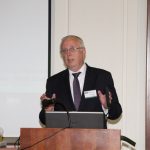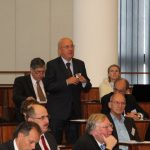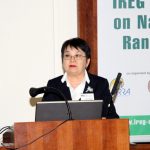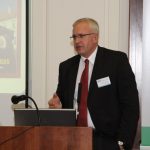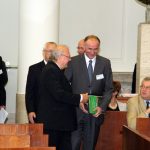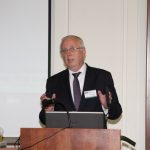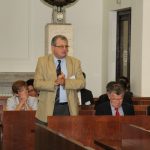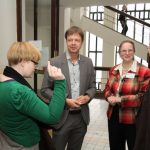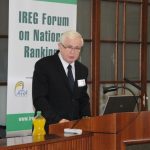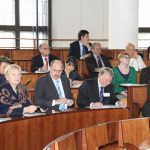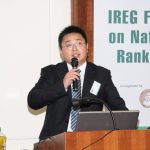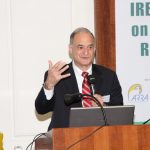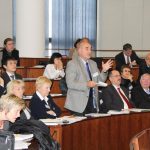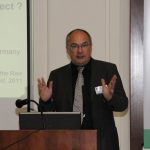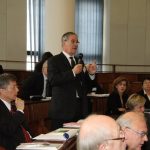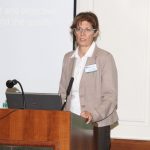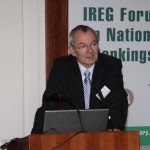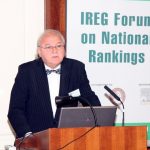
Invitation
IREG Forum: National University Rankings on the Rise
Background, context and objectives
Simon Marginson
Professor of Higher Education, University of Melbourne
University rankings and their growing importance has become a feature of our times. Along rectors and higher education institutions managers also politicians, businesspersons, students and their parents, journalists and analysts take interest in rankings; they are debated, discussed and written about. Academic rankings have become a recognized and efficient tool helping improve the quality of higher education and research.
While rankings were first prepared and published on the national level (starting with the US News & World Report) debates and conferences have concentrated on international rankings. The national rankings, however, in spite of their local range and influence, they do influence prospective students and are as important to the future of higher education as international rankings are.
National rankings relying on data provided by a unified higher education system in their methodology, may use a rich spectrum of criteria and provide a more precise picture of ranked schools and allow for more reliable comparison between institutions.
The emergence and growth of international rankings have not replaced or slowed down the development of national rankings. In some countries, rankings have been just started recently. At the same time, the existing national rankings have implemented new methodological solutions and expanded set of criteria they use.
In spite of the growing number of national rankings, there exists a generally lack of knowledge on their current state, methodology and about the ways, rankings evolve. This is in contrasts with the needs of stakeholders not only in given countries but with the needs of stakeholders world-wide. Among the latter group of stakeholders are international students seeking in-depth information on higher education.
We invite authors, publishers and analysts of rankings to the IREG Forum: National University Rankings on the Rise in Bratislava, Slovak Republic which will be held 10-11 October, 2011. The Forum will concentrate on issues related to national rankings and impact rankings make.
Here are the three main aims of the Forum:
- to present the current trends in national rankings,
- to discuss relations between rankings and national higher education systems (their impact on the national higher education systems and choices made by students).
- to build bridges between national and international (world) rankings
The Forum, we expect, will gather many authors and publishers of the leading national rankings and main world rankings. The organizers also welcome active participation of university leaders and authorities responsible for the future of higher education both on national and international levels.
Proceedings of the Forum will be published (on the IREG Observatory website), to present the main national rankings and the trends prevailing in the field. This way the Forum will fill in the gap regarding knowledge about national rankings and their specific aspects. It will also provide context to international rankings.
IREG Forum: National Rankings on the Rise is organized by the IREG Observatory on Academic Ranking and Excellence and the Slovak Academic Ranking and Rating Agency (ARRA) in cooperation with the Comenius University in Bratislava.
We look forward to welcoming you in Bratislava.
The Organizing Committee
Programme
IREG Forum:
National University Rankings on the Rise
organized by:
IREG Observatory on Academic Ranking and Excellence
and
Academic Ranking and Rating Agency (ARRA), Slovak Republic
under auspicies:
Ministry of Education, Science, Research and Sport, Slovak Rebuplic
in cooperation with:
Comenius University in Bratislava
Bratislava, 10-11 October 2011
Venue: Comenius University Auditorium
AGENDA
(Status as 3 October 2011)
Sunday, 9 October 2011
Whole day Arrival of participants
16.00 – 18.00 IREG Ranking Audit experts meeting (closed meeting at Austria Trend Hotel)
19.30 – 22.00 Welcome Reception (Location: Austria Trend Hotel)
Monday, 10 October 2011
8.30 – 9.00 Registration
9.00 – 10.00 Opening Session
Speakers:
- Jan Sadlak, President of IREG Observatory (opening remarks )
- Ferdinand Devinsky, Board Member, Academic Ranking and Rating Agency (ARRA), Slovak Republic
- Karol Micieta, Rector, Comenius University in Bratislava, Slovak Republic
Keynote speaker: Eugen Jurzyca, Minister of Education, Science, Research and Sport, Slovak Republic
10.00 – 11.30 First Session : Origins and trends in national rankings
Chair: Ying Cheng, Executive Director, World-Class Universities Study Centre, Graduate School of Education, Jiao Tong University in Shanghai, China
Speakers:
- Bob Morse, Director, Data Research, US News & World Report, USA: How it all begun and where is it heading?
- Waldemar Siwiński, Vice-President of IREG Observatory; President, Perspektywy Education Foundation, Poland: National rankings as an integral part of the global university landscape
- Gero Federkeil, Vice-President of IREG Observatory; Manager in charge of Rankings, CHE – Center for Higher Education, Germany: What can national rankings learn from the U-Multirank project
Discussion
11.30 – 12.00 Coffee Break
12.00 – 13.30 Second Session : Evolution and new initiatives in national rankings – state of the art in 2011
Chair: Paul Serban Agachi, President of the Academic Council, Babes-Bolyai University in Cluj-Napoca, Romania
Speakers:
- Ivan Ostrovsky, Vice-Rector, Comenius University in Bratislava, Slovakia: ARRA´s experience in identification of the top research teams: case study of Slovak Academy of Sciences
- Francesco Grillo, Managing Director, Vision & Value, Italy: VISION Ranking of Italian universities
- Algimantas Sindeikis, Publisher of journal “Veidas”, Lithuania: Ranking of Lithuanian universities
Discussion
13.30 – 15.00 Lunch
15.00 – 16.30 Third Session: Evolution and new initiatives in national rankings – state of the art in 2011 (continuation)
Chair: Boguslaw Smolski, former Director, National Centre for Research and Development, Poland
Speakers:
- Cai Juan Wen, Jiao Tong University in Shanghai, China,
and Ying Cheng, Executive Director, World-Class Universities Study Centre, Graduate School of Education, Jiao Tong University in Shanghai, China: New university ranking in China - Patricia Georgieva, Quality Assurance in Higher Education Expert, Bulgaria: Introducing the university rating system in Bulgaria – purpose, methodology and first reactions
- Fatih Omruuzun, Informatics Institut, Middle East Technical University in Ankara, Turkey: URAP – University Ranking by Academic Performance
Discussion
16.30 – 16.45 Coffee Break
16.45 – 18.15 Fourth Session : Role of rankings in national educational systems
Chair: Thomas D. Parker , Senior Associate, Institut for Higher Education Policy (IHEP), USA
Speakers:
- Nguyen Phuong Nga, Director General, Institute for Education Quality Assurance (INFEQA), Vietnam National University in Hanoi: National University rankings in Vietnam: The influence of international rankings on methodology
- Sholpan Kalanova, President, Independent Quality Assurance Agency (IQAA), Kazakhstan: Role of university rankings in Kazakhstan
- Erik Martijnse, Director, Department of Higher Education, Dutch Inspectorate of Education, Netherlands: Transparency in the quality of higher education and the role of performance profiles: the Dutch experience
Discussion
20.00 Conference Gala Diner (Location: Austria Trend Hotel)
Tuesday, 11 October 2011
9.00 – 10.30 Fifth Session : Methodology issues of national and international rankings
Chair: Waldemar Siwiński, Vice-President of IREG Observatory; President, Perspektywy Education Foundation, Poland
Speakers:
- Valerie Thiel, Consultant at Elsevier B.V.: SciVal: input, output and outcomes
- Evgeny Kniazev, Director, Center for University Management, National Research University “Higher School of Economics” in Moscow, Russia: Ranking as tool for creation diverse and competitive higher education landscape in Russia
- Ilie Rotariu, Profesor, „Lucjan Blaga” University in Sibiu, Romania: Ranking influence on Romanian universities
Discussion
10.30 – 11.00 Coffee Break
11.00 – 12.30 Sixth Session : IREG Ranking Audit – setting the standards while increasing reliability
Chair: Klaus Hüfner, Coordinator of IREG Ranking Audit; Professor Emeritus, Free University of Berlin, Germany
Co-Chair: Gero Federkeil, Vice-President of IREG Observatory; Manager in charge of Rankings, CHE – Centre for Higher Education, Germany
Panel of Auditors:
- Carla Cauwenberghe, Senior Inspector, the Dutch Inspectorate for Education, the Netherlands
- Stanislaw Chwirot, Dean, Faculty of Physics, Astronomy and Applied Informatics, Nicolaus Copernicus University in Torun (former Chairman of the Polish University Accreditation Council), Poland
- Tom Parker, Senior Associate, Institute for Higher Education Policy (IHEP), USA
Discussion
12.30 – 13.00 Closing Remarks
Jan Sadlak, President of IREG Observatory
13.00 Farewell lunch
13.30 – 15.00 IREG Observatory Executive Committee Meeting ( closed session )
Call for papers
The theme of IREG Forum is National Rankings on the Rise. The forum sessions will address the issues concerning current trends in national rankings, their impact on national higher education systems and relations between national and world rankings. More specifically, the IREG Forum will address, but will not be limited to, the following topics:
National university rankings:
- presentation of new initiatives in national rankings (excluding those already presented at IREG Conferences)
- evolution of national rankings (those presented earlier at IREG Conferences)
- experience and best practices in preparing and publishing national rankings
Rankings and national higher education systems:
- influence of rankings on the national higher education systems
- national rankings and quality of higher education
- rankings influencing students’ choices – the experience related to new mobile internet technologies
Relations between national and international (global) rankings:
- influence of international (global) rankings on methodology and organization of national rankings
- building bridges between international and national rankings – experience, new initiatives
- the role of national and international rankings in building a coherent information system on higher education
Participants interested in presenting a contribution in one of above-mentioned areas are kindly asked to submit an abstract of up to 2,000 words by May 1, 2011. The Program Committee of IREG Forum will make selection of received proposals to be presented at the conference.
The author[s] of selected papers will be informed by June 1, 2011 and are kindly requested to submit the full text of the respective paper by September 1, 2011 so that drafts of selected papers can be distributed during the forum.
Contact: dr Kazimierz Bilanow
k.bilanow@ireg-observatory.org
Venue
All sessions will be held at the Comenius University in Bratislava , Auditorium of the Law Faculty
address: Safarikovo nam. 6
 |  | |||
 | ||||
The conference venue is 15-20 minutes´ walking distance from the hotel (see the attached map). You can also call a taxi service: Happy Taxi – 00421 902 222 333, Fun Taxi – 00421 2 16 777, Prima Taxi – 00421 2 16 661
Within the city center (from the hotel to the conference venue; or from the hotel to the bus or railway station), the price of taxi should not exceed 5 EUR.
Ask for the price beforehand to avoid any nuisances
Hotel
A contingent of rooms has been blocked for participants at Austria Trend Hotel Bratislava****
Single rooms are available at a reduced price of 80,00 EUR per night (buffet breakfast included). The deadline for special price is August 31, 2011. First, register for the Forum, and then download hotel registration form here.
Address: Austria Trend Hotel Bratislava, Vysoka 2, 814 11 Bratislava
Web page: http://www.austria-trend.at/bra
Practical information
TRAVELING TO BRATISLAVA
You can choose between Bratislava own international airport and Schwechat airport in Vienna, which is 45 km from Bratislava and connected by regular shuttle buses. Bratislava’s airport has regular flights to other Slovak and major European destinations. However, Vienna airport offers considerably more international and intercontinental connections.
- From Bratislava airport to the City Center
Public Transport: bus N° 61 in direction to Main Railway Station and N° 96, in direction to Petržalka, Prokofievova Street. Bus Stop in front of Arrival Terminal B (Access map)
- From Vienna airport to Bratislava
By Shuttle Bus
There are shuttle buses connecting Vienna airport and the Bratislava city center (main Bus Station “AS Mlynske Nivy”) every hour or every half an hour. Buses to Bratislava depart from the bus stop directly in front of the arrival hall. See the timetable in PDF attached
Tickets are available on the website slovaklines.sk , at the Bus Station “AS Mlynske Nivy”, or with the bus driver.
Return ticket Vienna airport/Bratislava Bus Station and back costs 14,30 EUR
By train
International trains to Bratislava’s main railway station run from Vienna (1 hour), Budapest (3 hours), and Prague (4-5 hours) several times a day. There are less frequent direct connections to Berlin, Bucharest, Kiev, Moscow and Warsaw. The main railway station is a short distance from the centre and there is a regular tram connection; alternatively, walking takes 15-20 minutes.
Slovakia is a member of the European Union. Please inquire at the Slovak embassy/consulate in your country as to whether or not you need an entry visa for Slovakia. If necessary, you will be provided with an invitation letter as an official document for obtaining the visa.
Visa information in English:
REGISTRATION AND FEES
- Conference fee
The conference fee is 450,00 EUR; early bird registration is 350,00 EUR and is valid till 15 June, 2011.
Registration is free (one person) for IREG Observatory members.
Registration fee includes welcome reception, meals on 10 and 11 October (including Conference Diner) and coffee breaks. - Registration
To register for the IREG FORUM please visit: http://www.ireg-observatory.org/rejestracja/
OTHER USEFUL INFORMATION
- CURRENCY: EURO
- WEATHER: The average temperature in October is about 15 C degrees. It can be rainy.
- TIME: Central European Time (CET), GMT + 2 hours.
- ELECTRICAL APPLIANCES: The voltage is 220 – 240 Volts. Plugs are two pin European continental size.

